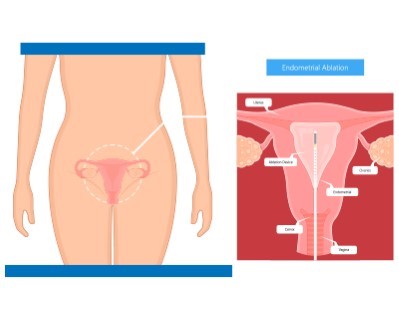Endometrial Ablation
- Purpose: Treats heavy menstrual bleeding by destroying the lining of the uterus.
- Procedure: Various methods, including heat, cold, or radiofrequency, are used to ablate the endometrium.
-
Note: The information provided here applies to standard Endometrial Ablation procedures under typical conditions. However, specifics may vary based on individual factors, such as the patient’s overall health, the type of ablation method used, and any complications that might arise during or after the procedure. Patients seeking this procedure through health tourism should also consider local regulations and the importance of choosing a reputable clinic that adheres to international standards.
Inpatient/Outpatient
Endometrial ablation is typically performed as an outpatient procedure, allowing most patients to return home the same day after a brief recovery period.Hospital Stay Duration
Patients undergoing endometrial ablation generally do not require an overnight hospital stay. They are usually discharged a few hours after the procedure, once they have recovered from anesthesia and are stable.Type of Anesthesia
Endometrial ablation is usually performed under local or regional anesthesia, though general anesthesia may be used depending on the patient’s condition and the specific technique employed.Travel After Procedure
Patients are generally advised to avoid long-distance travel for at least 24 to 48 hours after the procedure to allow for initial recovery and to monitor for any potential complications, such as cramping or bleeding.Pre-procedure Preparation
Preparation for endometrial ablation involves following specific instructions from the healthcare provider, which may include fasting before surgery, adjusting medications, and undergoing pre-operative tests such as blood work and imaging. Patients should ensure they have all necessary documentation and medical records if traveling internationally for the procedure.Procedure Duration
The endometrial ablation procedure typically lasts between 30 minutes to 1 hour, depending on the method used. The surgeon uses various techniques, such as heat, cold, or radiofrequency energy, to destroy the lining of the uterus to reduce or stop menstrual bleeding.Recovery Time
Recovery from endometrial ablation is generally quick, with most patients able to resume light activities within a few days. Full recovery may take about 1 to 2 weeks. Patients should avoid strenuous activities and sexual intercourse until cleared by their healthcare provider.Estimated Cost
The cost of endometrial ablation can vary depending on the method used, the surgeon's expertise, and geographic location. Patients should consult their healthcare provider or surgical center for detailed cost information, including any additional fees for follow-up care and medications.Post-procedure Care
Post-operative care for endometrial ablation includes managing pain, preventing infection, and monitoring for any signs of complications. Patients may experience cramping, mild pain, or watery discharge for a few days after the procedure. Follow-up appointments are essential to ensure proper healing and to discuss the results of the procedure. Any signs of complications, such as heavy bleeding, fever, or severe pain, should be reported to the healthcare provider immediately.

